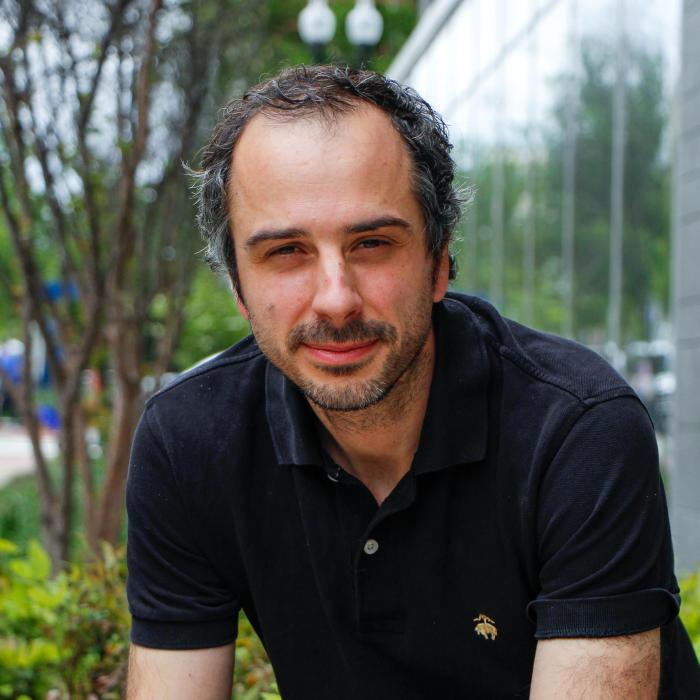Jakub Kostal

Jakub Kostal
Associate Professor of Chemistry, Director of the MS Environmental and Green Chemistry Program
Contact:
Co-Director of the Environmental and Green Chemistry Program
Computational chemistry, green chemistry, predictive toxicology
Many commercial chemicals pose hazards to human and environmental health. Yet, current legislative programs often do not require that chemicals are tested for safety before they are put into production. In fact, the overwhelming majority of chemicals in use today have never been independently tested for safety. Lax regulations and prohibitive costs of animal testing are the main reasons why chemicals like BPA, phthalates, or PBDEs are pulled off the market after prolonged public outcry, only to be replaced with equally toxic substances. Socially and economically, this is not a sustainable approach. To provide a viable alternative to animal tests, we develop computer models to study the mechanisms by which toxicants interact with biological targets, such as enzymes or nucleic acids. Our methods rely on the know-how acquired in computer-aided drug discovery over the past two decades. In conjunction with toxicological data, we then build fast, inexpensive, and accurate algorithms that predict toxicity outcomes and constitute frameworks for rational design of safer chemicals.
Over the past year, Jakub Kostal’s research group at George Washington University has made significant contributions to the field of green computational chemistry, focusing on the development of sustainable chemical processes and materials. Their work has aimed to minimize the environmental impact of chemical industries by advancing computational methods to design safer, more sustainable chemicals and processes. The current team at the Kostal group is led by three graduate students, Jillian Brejnik, Diana Garnica Acevedo and Geetesh Devineni.
One of the key accomplishments of the group has been the refinement of computational models used to predict the toxicity and environmental persistence of chemicals before they are synthesized, working on predicting the photodegradation and biodegradation routes of depletion. These models, when fully validated, allow for the design of "green" chemicals with reduced ecological risks, enhancing the ability of industries to shift toward sustainable practices. By integrating machine learning algorithms and quantum mechanical calculations, the team has created powerful tools to predict the environmental behavior of biobased compounds to potentially replace existing pesticides. This predictive capacity helps identify potential hazards early in the design process, ensuring that safer chemicals are selected for manufacturing.
The Kostal group has also been increasingly interested in optimizing chemical reactions along green metrics and sustainability considerations. These efforts are made possible by collaborating with the Lapkin group at Cambridge University in the UK, which focuses on sustainable process engineering using AI.
Chem 1112: General Chemistry II
Chem 2122: Intro Quantitative Analysis
Chem 6257: Physical Organic Chemistry
Kostal, J.; Voutchkova-Kostal, A.M. CADRE-SS an in silico tool for predicting skin sensitization potential based on modeling of molecular interactions. Chem. Res. Toxicol, 2016, 29, 58-64
Kostal, J.; Voutchkova-Kostal, A.M.; Zimmerman, J.B.; Anastas, P. Identifying and Designing Chemicals with Minimal Acute Aquatic Toxicity. Proc.Natl.Acad. Sci. USA Early edition 2015, 112, 6289-6294
PhD., Yale University, 2012
B.A. Middlebury College 2006
Professor Jakub Kostal and his group developed a “…powerful tool for both the industry and regulatory agencies…”, this is a new computational approach to rapidly screen pesticides for safety, performance, and how long they endure in the environment. The new approach will aid in the design of next-generation molecules to develop safer pesticides.
Dr. Kostal was a speaker at The White House Office of Science and Technology Policy Council’s Strategy Team on Sustainable Chemistry Webinar to help the Biden-Harris Administration fulfill their commitment to moving the Federal effort on sustainable chemistry forward--Utilizing data for sustainable chemistry decisions: what data and tools will enable the best-informed decisions?

